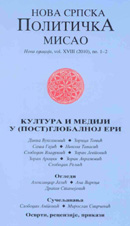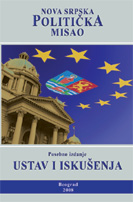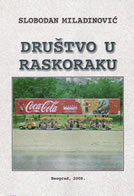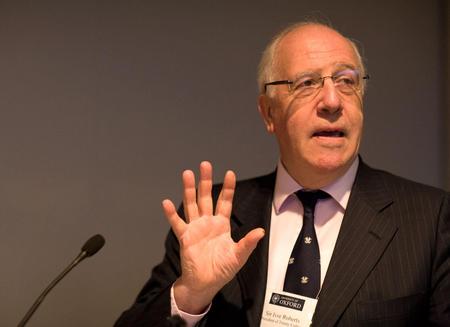| NSPM in English | |||
Time for partition in Kosovo |
 |
 |
 |
| субота, 31. јул 2010. | |
|
(The Independent) It was entirely predictable that talks over the future of Kosovo between the Serbs and KosovarAlbanians should have ended with no agreement reached. There are two main reasons why this problem is proving so intractable: one ancient, one modern. The loss of Kosovo, the cradle of Serb civilisation, to the Ottoman Turks over 600 years ago was felt as keenly as & the loss of Jerusalem by the Jews to Roman imperial forces. When at last Serbia reacquired Kosovo after the first Balkan War of 1912, the ensuing territorial division left more than half the Albanian people outside the borders of the new Albanian state and with a deep sense of injustice and grievance. Let me quote the bitter parting words of Isa Boletini, the leader of the Albanian delegation to the London Ambassadors’ Conference of 1913 which confirmed Kosovo as part of Serbia: “when spring comes, we will manure the plains of Kosovo with the bones of Serbs, for we Albanians have suffered too much to forget”. Since then in what we may call more modern times, whoever has been top dog in Kosovo has maltreated the other. This has generally, and most egregiously under Milošević, meant Serbs maltreating Albanians, though when the boot has been on the other foot, it has been applied with some vigour. Moreover, it was hard to imagine that an agreement would be reached last week when the Kosovar Albanians had already been told before the talks started that their position on independence was being supported by the US and the EU. When President Bush visited Albania last June, he told an enthusiastic crowd, perhaps the most enthusiastic he has encountered outside the US for many years, that Kosovo should be independent. By thus removing any incentive for the KosovarAlbanians to compromise on their independence stance, the US fatally undermined the negotiations before they began. In fact, the Bush intervention was more like an echo of General de Gaulle’s infamous visit to Quebec 40 years ago and his call “Vive le Québec libre”, with the difference that de Gaulle was promptly asked to leave the country, while President Bush was garlanded. But both were irresponsible. Given the impasse we have now reached where the West is mainly committed to supporting qualified Albanian independence and Russia is equally committed to blocking any agreement in the Security Council which does not command support from Serbia, it may be timely to look at imaginative alternative solutions, however uncomfortable they are for both sides and unwelcome to the international community. The West is fond of the mantra that the status quo is not sustainable. What they really mean is that Kosovar Albanian expectations of imminent independence have been raised to such an extreme that any frustration of independence will lead to violence against the NATO forces. So we must give Kosovo its independence quickly to prevent this happening. The status quo is very unstable but we must change it in ways which mahe it better not worse. So Kosovo should become independent but not within its present borders. Within the negotiating process, one of the excluded options (self-imposed by the international community) was that Kosovo should not be partitioned. It is hard to understand the intellectual underpinning of this policy when the old Yugoslavia has been progressively partitioned and when the proposal to give Kosovo its independence is itself a partition of Serbia. The unstated concern is clearly that the partition of Kosovo could lead to pressure for a partitioning of Bosnia, a proposition which the international community themselves incidentally accepted (and later retracted) during the earlier stages of the negotiations (on HMS Invincible) to bring the war in Bosnia to an end. Again, the Kosovar Albanians have been told that they are not allowed in the event of independence to unite with Albania. This is patently absurd as if two independent countries freely wish to unite and do not destabilize their neighbours in doing so, there is no justifiable reason why they should be prevented from going ahead. The reality is, whatever the pious hopes of the West and its diplomats, that multi-ethnicity has failed in Bosnia and Kosovo.(Neither Bosnian Croats nor Serbs pass the Tebbit cricket test.) But the determination to deny the failure has led to particularly incoherent policies by the West, pushing for more centralisation in Bosnia to weaken the Bosnian Serb entity to the benefit of the Bosnian central government, while going in the other direction in Kosovo to the point of secession. As we found in Northern Ireland, where intercommunal violence has been endemic it sometimes becomes necessary to erect fences to keep neighbours from each other’s throats. Indeed nearly 10 years after the Good Friday Agreement there are now more peace walls in Belfast than ever.. And as the West’s aspirations for tolerance and multi-ethnicity in Kosovo have proved to be so much empty rhetoric (the lot of the Serbs in Kosovo is at least as wretched as that of the Albanians in Kosovo pre 1999), we need to impose a solution which offers security to both communities. That requires the partition of Kosovo. Not easy but the least worst of the current options and certainly less likely to cause instability than a unilateral declaration of independence by the Kosovar Albanians. This need not be a permanent solution. In time if the two communities can reopen a dialogue based on a common feeling of security, there is a chance that having lived separately they will manage in time to come closer together, in the wider context of EU membership. At that stage, borders can become marks of distinction rather than division, in the words of Hubert Butler, and eventually drop off like used sticking plaster. Partition of Kosovo will please neither side but the equality of pain is more likely to lead to stability than present Western plans which will undoubtedly destabilise Serbia, and through Serbia the whole region. It is hard to explain to Serbs why, when Milošević was still in power a settlement was imposed which left Kosovo legally and formally part of Serbia. But having overthrown Milošević by their own efforts and lived according to the rules of the international community for the last seven years, the Serbs now face being punished by losing nearly 20% of their territory. It is not a policy which is likely to strengthen the already fragile plant of democracy in Serbia. The fires of nationalism risk being reignited. Sir Ivor Roberts is president of Trinity College, Oxford, and a former UK ambassador to Yugoslavia, Italy and Ireland |
Од истог аутора
Остали чланци у рубрици
- Playing With Fire in Ukraine
- Kosovo as a res extra commercium and the alchemy of colonization
- The Balkans XX years after NATO aggression: the case of the Republic of Srpska – past, present and future
- Из архиве - Remarks Before the Foreign Affairs Committee of the European Parliament
- Dysfunction in the Balkans - Can the Post-Yugoslav Settlement Survive?
- Serbia’s latest would-be savior is a modernizer, a strongman - or both
- Why the Ukraine Crisis Is the West’s Fault
- The Ghosts of World War I Circle over Ukraine
- Nato's action plan in Ukraine is right out of Dr Strangelove
- Why Yanukovych Said No to Europe

.jpg)






















